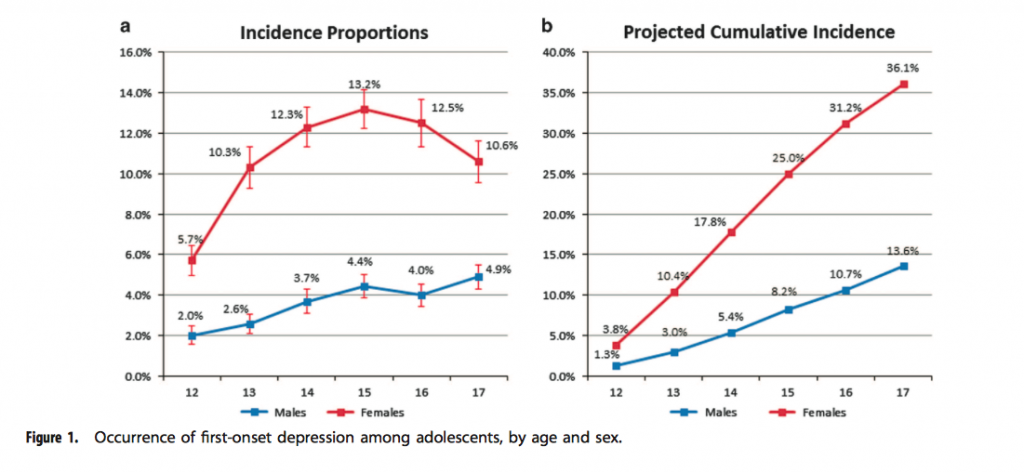A large new study published in Translational Psychiatry found that a staggering 36.1% of girls have been or are depressed by the time they turn 17. The study analyzed data from the National Survey of Drug Use and Health, which consists of in-person interview responses from over 100,000 children.
 (Translational Psychiatry)
(Translational Psychiatry)
There are some different theories as to why depression is more common among teenage girls than boys. Biological differences, such as changes in hormones, are one potential cause. Brain scans show that girls process emotions differently the boys on a structural level. Others believe that the socialization of girls make them more susceptible to the heightened social pressure of the teenage years.
Not only do girls experience depression at a higher rate than boys, but studies show that girls experience the symptoms of depression differently as well. Boys and girls express most of the classic symptoms of depression like withdrawal, enduring sad moods, and sleep and appetite changes similarly.
However, depressed girls tend to experience stronger feelings of guilt, self-blame, and failure than boys. Teen girls also have the added weight of body image dissatisfaction, and are at a higher risk for developing eating disorders. Depressed girls may notice more trouble concentration problems and sleep problems than depressed boys as well.
Depressed boys experience more anhedonia, the inability to feel pleasure from activities once found enjoyable, such as exercise, hobbies, music, or social interactions. Boys also have more depressed moods in the morning and experience more intense morning fatigue than girls. Some teenage boys may express more irritation than withdrawal, acting out and putting themselves in dangerous situations, like fighting.
Parents, teachers, and others who spend time with children should be aware of the signs and symptoms of depression. Since major depression disorder is so internally focused, it may be hard for a teen’s loved ones to immediately distinguish depression from run of the mill teenage moodiness. Excessive sleep, change in eating habits, sudden drop in grades, and a depressed mood that lasts longer than 2 weeks, are some of the outward signs of depression to look out for in both girls and boys. If you think your child may be suffering from depression, remember it’s your job to understand them, not fix them. Be ready to listen without judgement and gently guide them to find a treatment that works for them.
Sources: Translational Psychiatry, Washington Post, Child Mind Institute
Do you or your child suffer from depression? See if you may qualify for Preferred Research Partners pediatric and adult depression clinical research study opportunities today. Fill out the form below to learn more.
